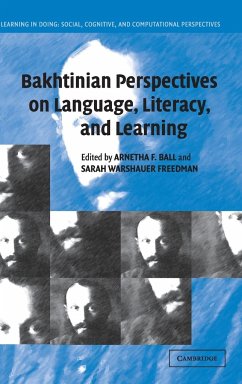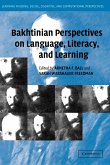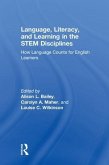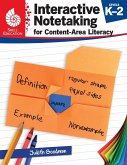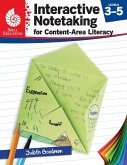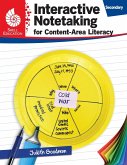Short description/annotation
This represents a multidisciplinary collaboration that highlights Mikhail Bakhtin's theories and modern scholarship.
Main description
This represents a multidisciplinary collaboration that highlights the significance of Mikhail Bakhtin's theories to modern scholarship in the field of language and literacy. Book chapters examine such important questions as: What resources do students bring from their home/community environments that help them become literate in school(?)33; What knowledge do teachers need in order to meet the literacy needs of varied students(?)33; How can teacher educators and professional development programs better understand teachers' needs and help them to become better prepared to teach diverse literacy learners(?)33; What challenges lie ahead for literacy learners in the coming century(?)33; Chapters are contributed by scholars who write from varied disciplinary perspectives. In addition, other scholarly voices enter into a Bakhtinian dialogue with these scholars about their ideas. These 'other voices' help our readers push the boundaries of current thinking on Bakhtinian theory and make this book a model of heteroglossia and dialogic intertexuality.
Table of contents:
Part I. Ideologies in Dialogue: Theoretical Considerations: 1. Ideological becoming: Bahktinian concepts to guide the study of language, literacy and learning; 2. Dewey and Bakhtin in dialogue: from Rosenblatt to a pedagogy of literature as a social, aesthetic practice; 3. Intertextualities: Volosinov, Bakhtin, literacy theory, and literacy studies; 4. Voices in the dialogue: the teaching of academic language to minority second-language learners; Voices in dialogue; Part II. Voiced, Double Voiced, and Multi-voiced Discourses in our Schools: 5. Performance as the foundation for a secondary school of literacy program: a Bakhtinian perspective; 6. Double voiced discourse: African American vernacular English as resource in cultural modeling classrooms; 7. Narratives of rethinking: the inner dialogue of classroom discourse and student writing; 8. Authoring pedagogical change in secondary subject-area classrooms: ever newer ways of meaning; Voices in dialogue: multi-voiced discourses in ideological becoming; Part III. Heteroglossia in a Changing World: 9. New teachers for new times: the dialogical principle in teaching and learning electronically; 10. Is contradiction contrary(?)33;; 11. A Bakhtinian perspective on learning to read and write late in life; 12. New times and new literacies: themes for a changing world; Voices in dialogue: hybridity as literacy, literacy as hybridity; dialogic responses to a heteroglossic world; A closing thought: Bakhtinian perspective; 13. The process of ideological becoming.
This represents a multidisciplinary collaboration that highlights Mikhail Bakhtin's theories and modern scholarship.
Main description
This represents a multidisciplinary collaboration that highlights the significance of Mikhail Bakhtin's theories to modern scholarship in the field of language and literacy. Book chapters examine such important questions as: What resources do students bring from their home/community environments that help them become literate in school(?)33; What knowledge do teachers need in order to meet the literacy needs of varied students(?)33; How can teacher educators and professional development programs better understand teachers' needs and help them to become better prepared to teach diverse literacy learners(?)33; What challenges lie ahead for literacy learners in the coming century(?)33; Chapters are contributed by scholars who write from varied disciplinary perspectives. In addition, other scholarly voices enter into a Bakhtinian dialogue with these scholars about their ideas. These 'other voices' help our readers push the boundaries of current thinking on Bakhtinian theory and make this book a model of heteroglossia and dialogic intertexuality.
Table of contents:
Part I. Ideologies in Dialogue: Theoretical Considerations: 1. Ideological becoming: Bahktinian concepts to guide the study of language, literacy and learning; 2. Dewey and Bakhtin in dialogue: from Rosenblatt to a pedagogy of literature as a social, aesthetic practice; 3. Intertextualities: Volosinov, Bakhtin, literacy theory, and literacy studies; 4. Voices in the dialogue: the teaching of academic language to minority second-language learners; Voices in dialogue; Part II. Voiced, Double Voiced, and Multi-voiced Discourses in our Schools: 5. Performance as the foundation for a secondary school of literacy program: a Bakhtinian perspective; 6. Double voiced discourse: African American vernacular English as resource in cultural modeling classrooms; 7. Narratives of rethinking: the inner dialogue of classroom discourse and student writing; 8. Authoring pedagogical change in secondary subject-area classrooms: ever newer ways of meaning; Voices in dialogue: multi-voiced discourses in ideological becoming; Part III. Heteroglossia in a Changing World: 9. New teachers for new times: the dialogical principle in teaching and learning electronically; 10. Is contradiction contrary(?)33;; 11. A Bakhtinian perspective on learning to read and write late in life; 12. New times and new literacies: themes for a changing world; Voices in dialogue: hybridity as literacy, literacy as hybridity; dialogic responses to a heteroglossic world; A closing thought: Bakhtinian perspective; 13. The process of ideological becoming.

